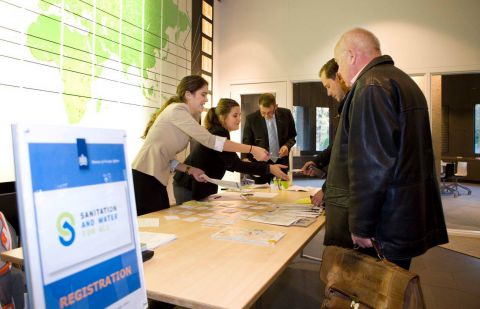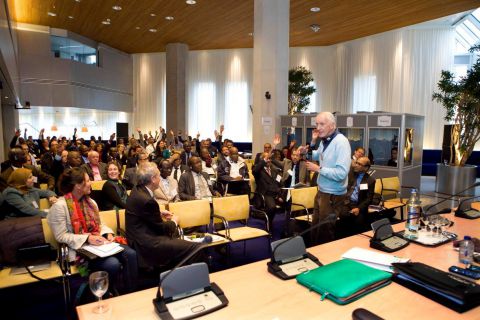Following the recent Sanitation and Water for All (SWA) Partnership meeting – which brought together a range of stakeholders in the water, sanitation and hygiene (WASH) sector – EWP member John Oldfield, CEO of WASH Advocates based in the US, offers writes on his reflections.
November 2015

These are heady times in the global safe drinking water, sanitation, and hygiene (WASH) sector as the Millennium Development Goals come to a mostly successful end, and as the Sustainable Development Goals (SDGs) get off to an energetic start. For the SDGs to succeed in providing WASH to everyone on the planet by 2030 – if not before – civil society organizations in the developed and developing countries need to strongly inform and influence the entire process, including the work of the Sanitation and Water for All (SWA) partnership. The recent SWA partnership meeting in The Hague gave me and many others hope and confidence that more and more civil society voices will be heard and acted upon by their own governments throughout developed and developing countries.
The key to accelerating progress toward the WASH SDGs is to make sure that developing countries themselves are driving this process. It is widely acknowledged that SDG stakeholders need to prioritize national and subnational plans and processes, and key to that will be the strongest possible dialogues between citizens and their governments across the globe.
SWA has a vital, timely opportunity to strengthen the work of its key civil society partners throughout Africa, Asia, and Latin America in order to ensure that those voices are heard clearly and acted upon decisively in their own countries and the donor community. The two-way street – the social contract – between people and their governments can be reinforced by using dialogues about sanitation and drinking water as a means to bring parties together.
Participants at the SWA partnership meeting debated myriad issues, including how SWA should support the SDG process, upcoming Ministerial meetings, how to track WASH budgets, how to best strengthen SWA’s capacity, and the ongoing role of civil society. They also shared with each other many of their ongoing efforts to prioritize sustainable WASH across the globe. One of the most interesting was the marketplace session where civil society network leaders took the opportunity to share the status of their dialogues with their respective governments in Benin, Bangladesh, Malawi, France, and the Netherlands. In many cases, these ongoing dialogues are strong, in others not so much. The work of SWA would be enhanced if it were to provide more assistance to regional and in-country civil society networks advocating with their governments for a stronger prioritization of WASH in those countries.
I left the partnership meeting hopeful and enthusiastic about SWA’s future. SWA members are serious about accelerating progress toward 100% coverage of WASH, and serious about making sure the voices of the poorest households and communities throughout Africa, Asia, and Latin America are heard and acted upon by their own governments. There is no more cherry-picking the easiest-to- reach during the SDGs, and we need to mobilize trillions, not billions, of dollars, the vast majority of which must come from developing countries themselves. A strong, professional civil society effort in each country is one of the most important pieces of the puzzle.
